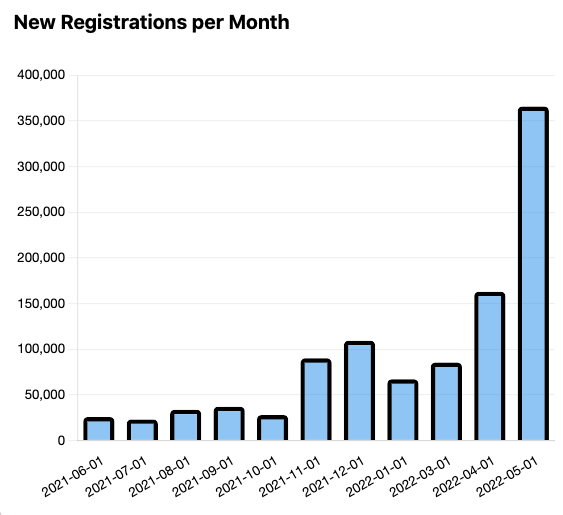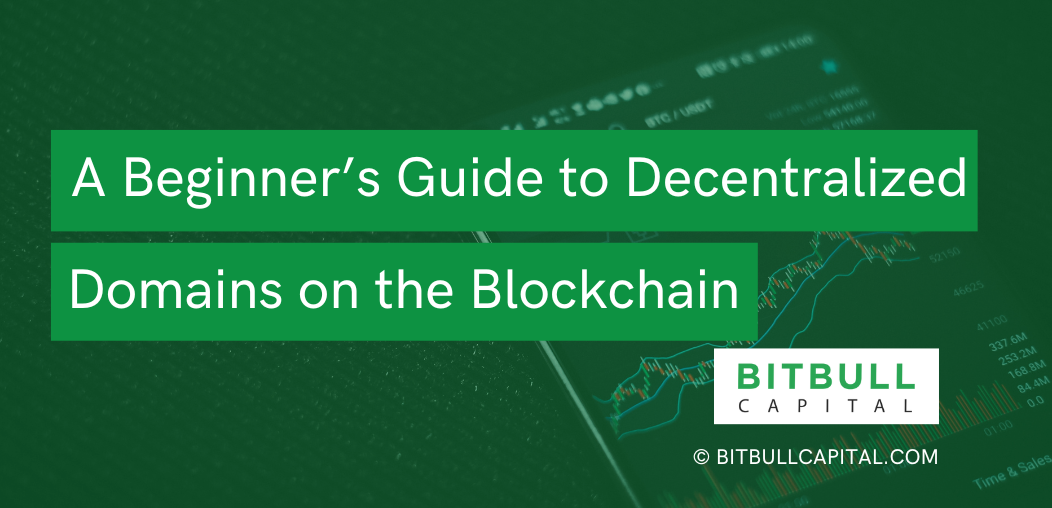A Beginner’s Guide to Decentralized Domains on the Blockchain
This beginner’s guide will help you understand decentralized domains on the blockchain. From the emergence of decentralized domains to their future, we’ve got you covered.
A blockchain is essentially a public ledger that records transactions and informs about the state. In order to obtain funds on a blockchain wallet, you need to know your blockchain address. Blockchain addresses are unique identifiers and can be compared to email addresses in web 2.
To self-custody your Bitcoins, you use a Bitcoin wallet that you control and then send the funds from the exchange where you purchased the Bitcoins to the address of your Bitcoin wallet. Other blockchains such as Ethereum or Solana work very similarly. However, with an Ethereum address, you can receive not only $ETH itself but also fungible ERC-20 tokens and non-fungible ERC-721 tokens (NFTs).
All transactions that are sent on the common blockchains such as Bitcoin and Ethereum are public. This means that anyone can inspect the transaction history of a given address with a blockchain explorer such as Etherscan. Therefore, you need to think carefully about whether you want to disclose your address to the public or not.
A Bitcoin address consists of 26-35 alphanumeric characters. Ethereum addresses consist of 42 characters. The length and composition of blockchain addresses make them unreadable to humans. For these reasons, the Ethereum Name Service (ENS) was launched in 2017 with the purpose of introducing human-readable addresses on the blockchain.
The Ethereum Name Service
The Ethereum Name Service (ENS) was created with the objective to provide addresses that are recognizable and memorable to humans and not only computers. For this purpose, an ENS record essentially consists of a string followed by the .eth domain. The string can consist not only of letters and numbers but may also consist of emojis.
The ENS protocol is governed by a decentralized autonomous organization, the ENS DAO. Decisions for the ENS DAO are taken by the $ENS token holders who can vote within a Governance Process. The ENS Foundation is a company registered in the Cayman Islands and acts as the legal entity representing the ENS DAO.
The $ENS token was launched via a retrospective airdrop. Early users of the Ethereum Name Service were rewarded for their participation in the form of an $ENS token allocation. The higher the usage of the ENS protocol was, the more tokens a user would receive. The $ENS token essentially acts as the governance token for the Ethereum Name Service.
Soon after the Ethereum Name Service launched, public Ethereum figures reserved the *.eth domain of their name and started using it in their Twitter name. Using a *.eth domain on Twitter quickly became a status symbol that signaled being a member of the Ethereum and ENS community. Many people also held their NFT collections on the same Ethereum address as their ENS so that all NFTs they were holding became publicly visible. The new registrations for ENS domains have constantly been growing in 2021 and 2022 as shown in the chart below:

How to use the Ethereum Name Service
In order to register an ENS domain, you need to first verify whether your desired domain is still available. If your desired domain was already registered, you might be able to purchase it on a secondary market.
In case your desired domain is still available, you can register it on the ENS domain service. You can select the number of years for which you want to register it and pay a fee accordingly. Additionally, you will need to pay the Ethereum gas fees for recording the transaction on the blockchain. Two Ethereum transactions are needed in order to register an ENS domain. After you purchase your ENS domain, you may link your wallet addresses to the domain.
Once you own a *.eth domain, you are entitled to create as many subdomains based on your domain as you wish. It is also possible to assign ownership of subdomains to third parties.
Ethereum is not the only blockchain that offers decentralized domains. Bonfida offers a Name Service for Solana with *.sol domains. The logic and use cases of Solana domains are very similar to ENS.
Monetary Value of ENS Domains
ENS domains are essentially like NFTs, which represent ERC-721 tokens. Just as common domains, popular ENS domains are in high demand and therefore valuable. They can be traded on OpenSea or other marketplaces just as any other NFT. The most popular ENS domains sell for very significant prices.
The latest hype in ENS domains was caused by people purchasing 3- and 4-digit domains. As all of these domains ended up being registered, the price started to increase on the secondary market. The logic behind the ENS NFT hype was that there are only 10,000 possible combinations of 4-digit numbers. This hype has led to a sharp increase in ENS sales on the secondary market.
While the value of the ENS domain is very volatile, there is little doubt that some of the domains will continue to carry significant value in the long term, just as their web 2 counterparts.
The Future of Decentralized Domains
As cryptocurrencies become more mainstream over the next years, we can expect the number of businesses that will register an ENS domain to increase.
The advantage of ENS compared to traditional domains is that it can be easily verified that you are the rightful owner of a decentralized domain. As a user, you can simply sign a message with your wallet that confirms that you are the rightful owner of the Ethereum wallet, which controls the ENS. No gas fees are required for signing messages. Furthermore, since the ENS domain represents an NFT, it can also easily be transferred without the involvement of any third party.
In the future, additional use cases of ENS seem possible. It is likely that certain apps will provide the option to log in with your ENS name and your Ethereum wallet. The advantage of this login option is obvious: you don’t need to store or remember any passwords. Additionally, it is much more difficult to hack your account.
To further discuss Decentralized Domains and BitBull Capital investment opportunities. Schedule a time here.

